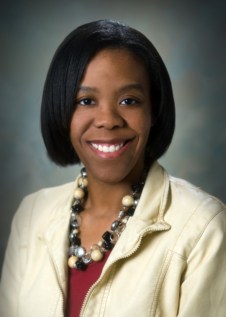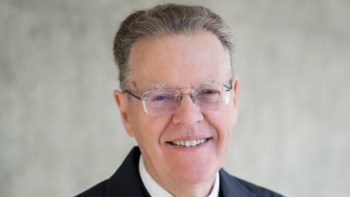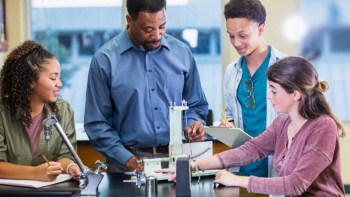Astrophysicist Gabriela González of Louisiana State University explains why the recognition that comes with the SEC Professor of the Year award is so important to her

Big science doesn’t get any bigger than the study and detection of gravitational waves, the elusive ripples in spacetime that have their origin in cataclysmic cosmic events – such as collisions between neutron stars or black holes – hundreds of millions of light years from Earth. At the heart of this endeavour is the advanced Laser Interferometer Gravitational-Wave Observatory (LIGO), two widely separated observatories in the US – one in Hanford, Washington, the other in Livingston, Louisiana – which registered the first detection of gravitational waves in 2016, a breakthrough deemed so fundamental it was acknowledged with the Nobel Prize in Physics the following year.
From 2011 through 2017, Gabriela González, professor of physics and astronomy at Louisiana State University (LSU) in Baton Rouge, served three successive terms as spokesperson and scientific lead for the LIGO Scientific Collaboration. This international research effort involves more than 1300 scientists and engineers from over 100 scientific institutions – all working as one to exploit the LIGO observatories in the emerging field of gravitational-wave astronomy and astrophysics.
González’s central role in the LIGO success story is evidenced by a string of high-profile awards, among them the US National Academy of Sciences Award for Scientific Discovery, the Bruno Rossi Prize from the High Energy Astrophysics Division of the American Astronomical Society, and the Special Breakthrough Prize in Fundamental Physics. Here she tells Physics World why an award closer to home has perhaps meant more than most after she was named the 2019 Southeastern Conference (SEC) Professor of the Year.
What did it mean to you when you were chosen as the SEC Professor of the Year for 2019?
The SEC award has touched me very much. There’s a previous winner of this award – Isiah Warner, professor of environmental and analytical chemistry at LSU – who has done so much great work in supporting minorities in science and higher education. I’ve tried to emulate Isiah’s approach in my own career, so it was very special when I learned that I was receiving the 2019 award.
Being the SEC Professor of the Year is also important because it recognizes my teaching and mentoring work with students here at LSU – not just the scientific achievement with LIGO. More broadly, the SEC Faculty Achievement Awards (see box, below) show that the SEC institutions value academic excellence in teaching and research just as much as their well-known sporting successes.
Our young scientists are the future: we need students who are open to new ideas and who can learn to innovate and think independently.
Gabriela González, LSU
How do you approach the teaching and training of the early-career scientists in your LSU team?
Our young scientists are the future: we need students who are open to new ideas and who can learn to innovate and think independently. That’s one of the reasons I’m a big believer in institutional collaboration. My graduate students and postdocs spend their time not just at LSU but at the LIGO observatories in Livingston and Hanford as well as other institutions in the US and internationally. Their research projects always involve collaboration – that’s something I actively encourage. I also aim to foster a spirit of independence, though sometimes my students probably think they get too much independence and would like a little more time from me.
The SEC award also recognizes your contribution to science outreach and education. Tell us more.
Me and my group at LSU are part of the team that helps run the LIGO Science Education Center in Livingston. We have a lot of high-school students and teachers visiting on field trips, while our “Science Saturdays” see LIGO open its doors to the public. There’s also a wider programme of engagement involving talks and presentations within the local community.
What about financial support for this work?
We recently received a $1m grant from the Patrick F Taylor Foundation, a charity that promotes educational initiatives across Louisiana. The funding means we can use the LIGO programme as a vehicle for science outreach to middle schools and high schools that are more remote or that may lack resources.
Our aim is to show students that internationally recognized research can be carried out at institutions in Louisiana by scientists who have gone to college here in Louisiana. It’s in the early days of development but we hope, in the long term, to increase the number of students who enrol and succeed in science.
You grew up in Argentina. What impact has your success had there?
It has meant a lot. It seems I’ve become something of a scientific celebrity back home and I’m often invited to give public talks. I get so much great feedback from children there – perhaps because they can relate to my back-story as a girl who grew up in Argentina. It makes me very happy that children – and especially girls – can see that science is an exciting and attractive career as a result of my efforts.
How has life changed for you since the discovery of gravitational waves?
Because of LIGO’s success, my career has developed in a lot of new directions – and especially since I completed my final term as the collaboration’s spokesperson. Last year, for example, I joined the steering committee of the Astro2020 Decadal Survey, a partnership between the National Academies and the astronomical community to identify funding priorities in astronomy and astrophysics. I also became editor-in-chief of the journal Classical and Quantum Gravity [published by IOP Publishing, publisher of Physics World] and joined the National Academies Board on Higher Education and Workforce.
I end up travelling a lot. I love it – but it’s not a normal life!
It just means more

The Southeastern Conference (SEC) Professor of the Year Award is presented annually to one SEC faculty member whose record of teaching and research places him or her among the elite in higher education. Winners are selected by the SEC provosts from among recipients of the SEC’s Faculty Achievement Awards, a foundational programme that recognizes academic excellence across the Conference’s 14 member universities.
“There’s tremendous value in recognizing professors who are making laudable contributions to higher education – both as researchers and educators,” explains Torie A Johnson, SEC associate commissioner for academic relations, an initiative designed to promote the academic achievements of the SEC universities. “These awards are part of a broader communication strategy and the compelling narrative we want to share about our faculty, students and administrators.”
While the SEC awards provide visibility and recognition to high-performing faculty members, the hope is that they also raise the academic awareness of SEC institutions nationally and internationally – by encouraging research collaborations with SEC scientists, for example, or promoting undergraduate and postgraduate recruitment into SEC institutions.
That recognition of academic endeavour is doubly important for SEC universities which, by and large, are better known in the US for their sporting success. (Last month, LSU reinforced that reputation when its American football team, the LSU Tigers, won the College Football Playoff National Championship.)
With this in mind, the SEC has for several years used a simple statement – “It just means more” – to underpin its marketing and positioning to the American public. Put another way: the SEC is not just about success in sports, it’s also highly accomplished in terms of academic research and undergraduate education.
“So, ‘it just means more’ connects to the faculty awards,” adds Johnson, “in the sense that we want everyone to know about the SEC through the work of Professor González and other outstanding SEC researchers and teachers like her.”




